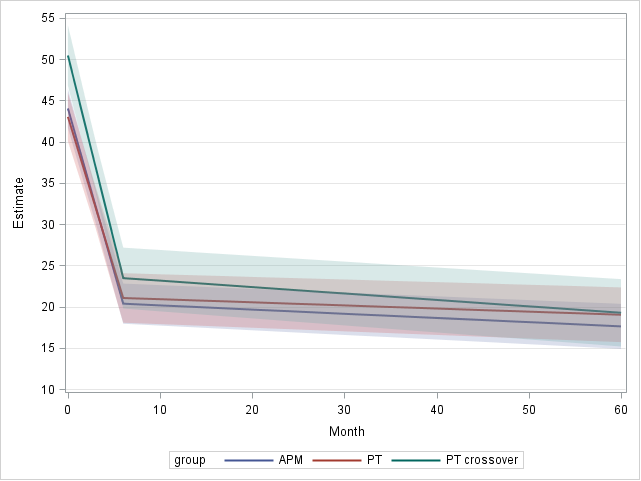Session Information
Session Type: ACR Plenary Session
Session Time: 11:00AM-12:30PM
Background/Purpose: While recent trials have examined short-term (~ 2 year) outcomes of surgical and nonoperative treatment of meniscal tear in the setting of osteoarthritis there has been little study of longer term outcomes of these treatments.
Methods: We examined 5-year outcomes of subjects in MeTeOR (Clintrials.gov NCT00597012), a multicenter randomized trial of physical therapy (PT) vs. PT plus arthroscopic partial meniscectomy (APM) for subjects with knee pain, meniscal tear and OA changes on xray or MRI. The primary outcome for this analysis was the Knee Osteoarthritis and Injury Outcome Score (KOOS) Pain Scale (0-100, 100 worst). Total knee replacement (TKR) was a secondary outcome. To address changes in KOOS Pain over 5 years, we used a piecewise linear mixed model, stratified by treatment group (randomized to and received APM; randomized to and received PT; randomized to PT but received APM during follow-up). The model censored subjects who had TKR and adjusted for age, sex, BMI, and mental health status. We used a pattern mixture model to assess whether the findings were biased by missing data due to TKR or losses to follow-up. We calculated the frequency of TKR over follow-up and used a Cox proportional hazards model to estimate the risk of TKR for treatment groups and KL grades, adjusting for baseline factors.
Results: The 351 subjects had mean age 58; 57% were female. 164 were randomized to and received APM; 109 were randomized to and received PT; 68 were randomized to PT and crossed over to receive APM. 10 subjects were randomized to but did not receive APM and were not analyzed. 66% of subjects completed ≥ 9 of 12 follow-up questionnaires, with similar completion rates across treatment groups. The piecewise linear model (Figure) showed similar pain improvement in the 3 treatment groups, with baseline KOOS Pain scores of 40-50 improving to 20-25 by 6 months and little change between 6 and 60 months. The pattern mixture models demonstrated similar patterns in pain scores as the main analysis, suggesting TKR and other losses to follow up did not bias these findings.
25 participants (7%) had TKR over follow-up. In the Cox model, the hazard of TKR was higher in those treated surgically (randomized to APM or crossed over) than those randomized to and receiving PT (HR 5.0, 95% CI: 1.2, 21.8), and in those with KL-3 radiographs vs. KL0-2 (HR 2.7, 95% CI 1.2, 6.4).
Conclusion: Pain relief was similar across treatment groups, while the few TKR’s were more common in those with KL3 and those receiving APM. These data suggest that persons with degenerative meniscal tear generally experience substantial pain relief over 5 years, irrespective of initial treatment. The greater risk of TKR in those treated with APM could reflect selection effects and/or faster progression of OA following surgery than following PT, and merits further study.
Fig: KOOS Pain (shaded 95% CI) stratified by treatment in piecewise linear model
To cite this abstract in AMA style:
Katz JN, Shrestha S, Losina E, Mandl LA, Levy B, Spindler K, Collins JE. Five-Year Outcome of Operative and Nonoperative Management of Meniscal Tear in the Presence of Osteoarthritic Changes [abstract]. Arthritis Rheumatol. 2018; 70 (suppl 9). https://acrabstracts.org/abstract/five-year-outcome-of-operative-and-nonoperative-management-of-meniscal-tear-in-the-presence-of-osteoarthritic-changes/. Accessed .« Back to 2018 ACR/ARHP Annual Meeting
ACR Meeting Abstracts - https://acrabstracts.org/abstract/five-year-outcome-of-operative-and-nonoperative-management-of-meniscal-tear-in-the-presence-of-osteoarthritic-changes/

